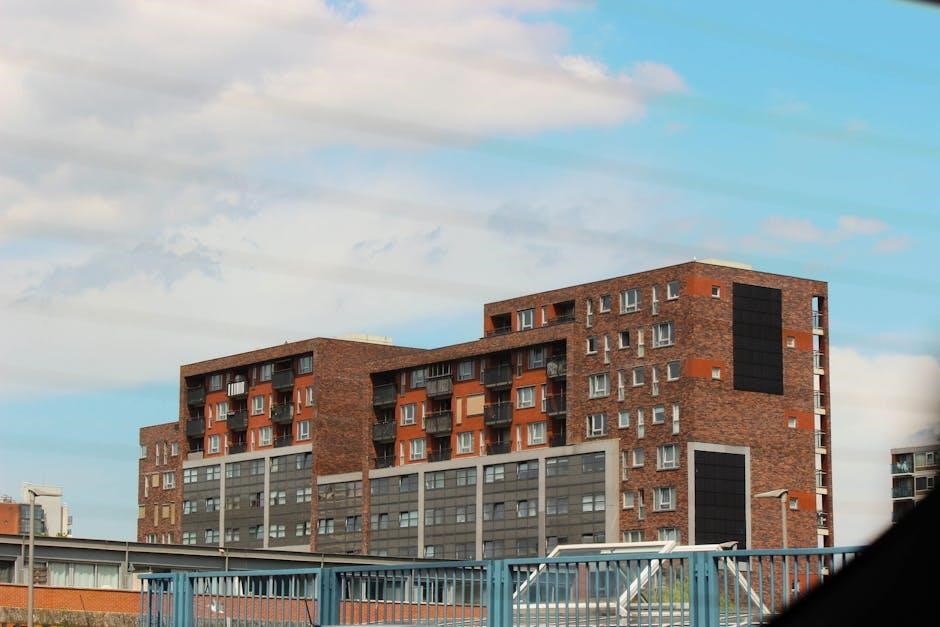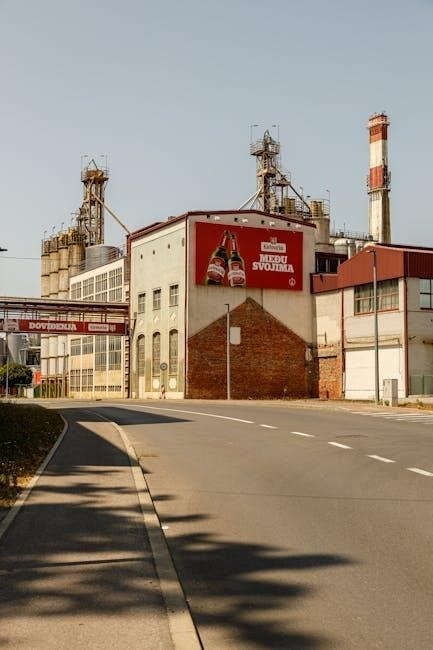
building and construction award pdf
The Building and Construction Award, managed by the Fair Work Commission, regulates minimum wages, classifications, allowances, and conditions for employers and employees in the industry.
1.1 Purpose and Importance of the Award
The Building and Construction Award ensures fair wages, safe working conditions, and compliance with labor laws for industry employees. It establishes minimum standards for employment, including classifications, allowances, and overtime, promoting equity and transparency. The award is crucial for both employers and employees, providing clarity on rights and obligations. It plays a key role in maintaining industry stability and preventing disputes by setting clear expectations and guidelines for workplace practices in the construction sector.
1.2 Overview of the Building and Construction Industry
The building and construction industry encompasses on-site activities in residential, commercial, and civil engineering projects. It includes sectors like housing, infrastructure, and industrial construction. Employers and employees covered by the award work on diverse projects, from highways to industrial plants. This industry is vital to Australia’s economy, employing thousands and driving development. The award plays a critical role in standardizing wages and conditions, ensuring fair labor practices and preventing disputes in this dynamic and essential sector.

Key Provisions of the Building and Construction Award
The award outlines wage rates, classifications, allowances, penalties, and overtime entitlements for employees in the building and construction industry, ensuring fair labor practices and standardized conditions.
2.1 Coverage of Employers and Employees
The Building and Construction Award covers employers in the on-site building, engineering, and civil construction sectors across Australia. It applies to employees engaged in various roles, including construction workers, engineers, and site managers. The award ensures that all eligible employees receive standardized wages, allowances, and entitlements. Employers must adhere to the specified classifications and conditions outlined in the award, promoting fairness and consistency within the industry. This ensures compliance with Fair Work Commission regulations.
2.2 Wage Rates and Classifications
The Building and Construction Award sets minimum wage rates for employees based on their job roles and experience. In 2023, a 5.7% increase was implemented, followed by a 3.75% rise in 2024. These adjustments aim to reflect cost of living changes and industry standards. The Fair Work Commission reviews and updates wage rates annually to ensure fairness and compliance with national employment regulations; Classifications are clearly defined to ensure equitable pay across all levels of employment within the construction sector.
2.3 Allowances, Penalties, and Overtime
The Building and Construction Award outlines specific allowances for workers, such as tool, travel, and meal allowances, to compensate for additional expenses. Penalty rates apply for work outside standard hours, including evenings, weekends, and public holidays. Overtime provisions ensure employees are fairly compensated for extended hours, typically at a higher rate. These provisions are regularly reviewed by the Fair Work Commission to align with industry standards and ensure equitable compensation for all workers in the construction sector.
History and Evolution of the Award
The Building and Construction Award originated in 2010, with significant updates in 2020 and ongoing reviews, reflecting industry changes and Fair Work Commission adjustments.
3;1 Building and Construction General On-site Award 2010
The Building and Construction General On-site Award 2010 was established to regulate wages and conditions for employees in the on-site construction industry. It covered employers and workers engaged in building, engineering, and civil construction projects. The award included provisions for wage rates, classifications, allowances, and overtime. It was a consolidated modern award by the Fair Work Commission, incorporating previous amendments. This award laid the foundation for subsequent updates, ensuring compliance with industry standards and legal requirements.
3.2 Building and Construction General On-site Award 2020
The Building and Construction General On-site Award 2020 is a consolidated modern award by the Fair Work Commission, incorporating all amendments up to 14 May 2025. It covers employers in the on-site building, engineering, and civil construction industry and their employees. The award outlines wage rates, classifications, allowances, penalties, and overtime provisions. It also includes part-day public holiday arrangements, reflecting updates to align with contemporary workplace practices and legal requirements, ensuring fairness and compliance for both employers and employees in the industry.
3.3 4-Yearly Review of Modern Awards
The 4-Yearly Review of Modern Awards ensures the Building and Construction Award remains relevant and fair. Conducted by the Fair Work Commission, this process involves reviewing and updating award provisions to reflect current workplace conditions. Recent reviews, such as Matter No: AM2014/301 and AM2019/17, have focused on wage adjustments, allowances, and public holiday provisions. The 2025 updates aim to align the award with contemporary industry needs and legal standards, ensuring compliance and fairness for employers and employees alike.
Wage Adjustments and Increases
Wage adjustments and increases under the Building and Construction Award are determined by the Fair Work Commission through annual reviews, ensuring fair pay aligned with industry standards.
4.1 2023 Wage Increase
The 2023 wage increase under the Building and Construction Award was implemented following the Fair Work Commission’s Minimum Wage Review. The wages were adjusted by 5.7% to reflect economic conditions and ensure fair pay for workers. This increase applied to all classifications within the award, effective from 1 July 2023. The adjustment aimed to support employees amidst rising living costs while maintaining industry competitiveness. The Fair Work Commission’s decision was based on extensive analysis of economic data and submissions from stakeholders.
4.2 2024 Wage Increase

The 2024 wage increase under the Building and Construction Award was announced by the Fair Work Commission, raising wages by 3.75%. Effective from 1 July 2024, this adjustment reflected economic conditions and aimed to balance employee remuneration with industry sustainability. The increase applied uniformly across all classifications within the award, ensuring fair compensation for workers. This decision followed the annual Minimum Wage Review, considering submissions from employers, employees, and industry representatives to maintain competitiveness and support workforce needs.

Allowances and Penalties
Allowances and penalties under the Building and Construction Award are detailed to compensate employees for specific conditions and overtime, as defined by the Fair Work Commission, ensuring fair workplace practices.
5.1 Definition and Operation
Allowances under the Building and Construction Award are additional payments for specific work conditions, such as tool usage or remote locations. Penalties refer to extra pay for overtime, night shifts, or public holidays. These provisions ensure employees are fairly compensated for challenging or inconvenient work circumstances, as outlined by the Fair Work Commission. The award’s structure ensures transparency and consistency in applying these allowances and penalties across the industry.
5.2 Specific Allowances in the Award
The Building and Construction Award specifies various allowances, including tool allowances, first aid allowances, and travel expenses; For instance, employees required to provide their own tools receive a weekly tool allowance. Additionally, workers in remote areas may receive accommodation and meal allowances. These specific provisions aim to compensate employees for additional costs or responsibilities incurred while performing their jobs, ensuring fair compensation across diverse work scenarios within the industry;
The Role of the Fair Work Commission
The Fair Work Commission oversees the Building and Construction Award, ensuring compliance, resolving disputes, and reviewing wage rates to maintain fairness and industry standards effectively.
6.1 Overview of the Fair Work Commission
The Fair Work Commission is an independent body tasked with ensuring the fairness of workplace relations across Australia. It focuses on resolving disputes, setting minimum wages, and maintaining industrial harmony. The commission plays a pivotal role in modernizing awards, including the Building and Construction General On-site Award, to reflect current industry needs and economic conditions, ensuring equitable outcomes for both employers and employees. Its decisions significantly impact the construction sector, shaping wages and working conditions.

6.2 Key Decisions and Reviews
The Fair Work Commission regularly reviews and updates the Building and Construction Award to ensure it aligns with industry needs. Recent key decisions include the 2023 and 2024 wage increases, raising rates by 5.7% and 3.75% respectively. The commission also conducts 4-Yearly Reviews of Modern Awards, addressing classifications and allowances. Additionally, decisions on part-day public holidays have been made to balance employer flexibility and employee entitlements, reflecting the commission’s role in maintaining fair workplace conditions across the construction sector.

Part-Day Public Holidays and Their Impact
Part-day public holidays allow flexibility for employers while ensuring employees receive entitlements for public holidays, balancing workplace needs and worker rights effectively.
7.1 Provisions for Part-Day Public Holidays
The Building and Construction Award includes provisions for part-day public holidays, enabling employers to adjust work schedules without penalty, ensuring employees receive entitlements for the observed holiday period, and maintaining operational flexibility while adhering to Fair Work Commission regulations.
7.2 Practical Implications for Employers and Employees
Part-day public holidays under the Building and Construction Award require employers to adjust rosters, potentially impacting productivity and staffing costs. Employees benefit from reduced working hours without loss of pay, enhancing work-life balance. Compliance with these provisions ensures employers avoid penalties while maintaining fair compensation, reflecting the Fair Work Commission’s commitment to balancing workplace flexibility with employee welfare in the construction sector.
Challenges and Controversies
The Building and Construction Award faces debates over wage growth balancing industry affordability, enforcement challenges, and compliance issues, impacting stakeholders and requiring adaptive solutions to ensure fairness.
8.1 Debates on Wage Growth and Industry Impact
Debates surrounding wage growth in the Building and Construction Award often center on balancing employee fairness and industry affordability. Recent wage increases, such as the 5.7% in 2023 and 3.75% in 2024, have sparked discussions about their impact on construction costs and project viability. Critics argue that higher wages could inflate project expenses, potentially deterring investment. Conversely, proponents emphasize the need for fair compensation to maintain workforce quality and productivity, ensuring the industry remains competitive and sustainable in the long term.
8.2 Enforcement and Compliance Issues
Enforcement and compliance with the Building and Construction Award remain challenging, with concerns over underpayment of wages and misclassification of employees. The Fair Work Commission has increased scrutiny, imposing penalties for non-compliance. However, complexities in interpreting allowances and overtime provisions often lead to disputes. Employers must stay updated on amendments, such as the 2025 changes, to avoid violations. Efforts to enhance transparency and education are ongoing to improve adherence and ensure fair workplace practices across the industry.

Recent Updates and Amendments
The Building and Construction Award 2020 was updated in 2025, incorporating new provisions for part-day public holidays and enhanced compliance measures to ensure fair workplace practices.
9.1 2025 Updates to the Award
The 2025 updates to the Building and Construction Award include new provisions for part-day public holidays, enhanced penalty rates, and revised allowances. These changes aim to align the award with modern workplace practices and ensure fair compensation for employees. The updates also introduce stricter compliance measures to prevent exploitation and promote transparency in wage calculations. Employers are now required to provide detailed records of payments, ensuring adherence to the revised regulations. These amendments reflect the Fair Work Commission’s commitment to maintaining equitable work conditions in the industry.
9.2 Impact of Recent Changes
Recent updates to the Building and Construction Award have significant implications for both employers and employees. Employers face increased compliance requirements, particularly regarding part-day public holidays and detailed payment records. Employees benefit from enhanced protections, including revised allowances and penalties, ensuring fairer compensation. The changes aim to modernize workplace conditions while addressing industry-specific challenges. These adjustments reflect the Fair Work Commission’s focus on balancing employer flexibility with employee welfare, ensuring the award remains relevant in a dynamic industry landscape.
The Building and Construction Award remains a cornerstone of the industry, ensuring fair wages and conditions. Its adaptability to modern workplace challenges underscores its enduring relevance and importance.
10.1 Significance of the Award in the Industry
The Building and Construction Award is pivotal in maintaining fair wages, classifications, and conditions for industry workers. It ensures employers and employees adhere to standardized practices, fostering stability and growth. By addressing modern workplace challenges, the award aligns with evolving industry needs, safeguarding workers’ rights while promoting productivity. Its significance lies in its adaptability, ensuring equitable treatment and compliance with legal standards, which are essential for the industry’s sustained development and future success.
10.2 Future Implications and Expected Changes
The Building and Construction Award is anticipated to evolve with industry trends and regulatory updates. Future changes may include adjustments to wage rates, classifications, and allowances to reflect economic conditions. The Fair Work Commission will continue to play a crucial role in ensuring the award remains relevant and fair. Upcoming reviews, such as the 2025 updates, are expected to address modern challenges, promoting sustainability and equity in the construction sector. These changes will aim to balance employer and employee needs while fostering industry growth.
Leave a Reply
You must be logged in to post a comment.